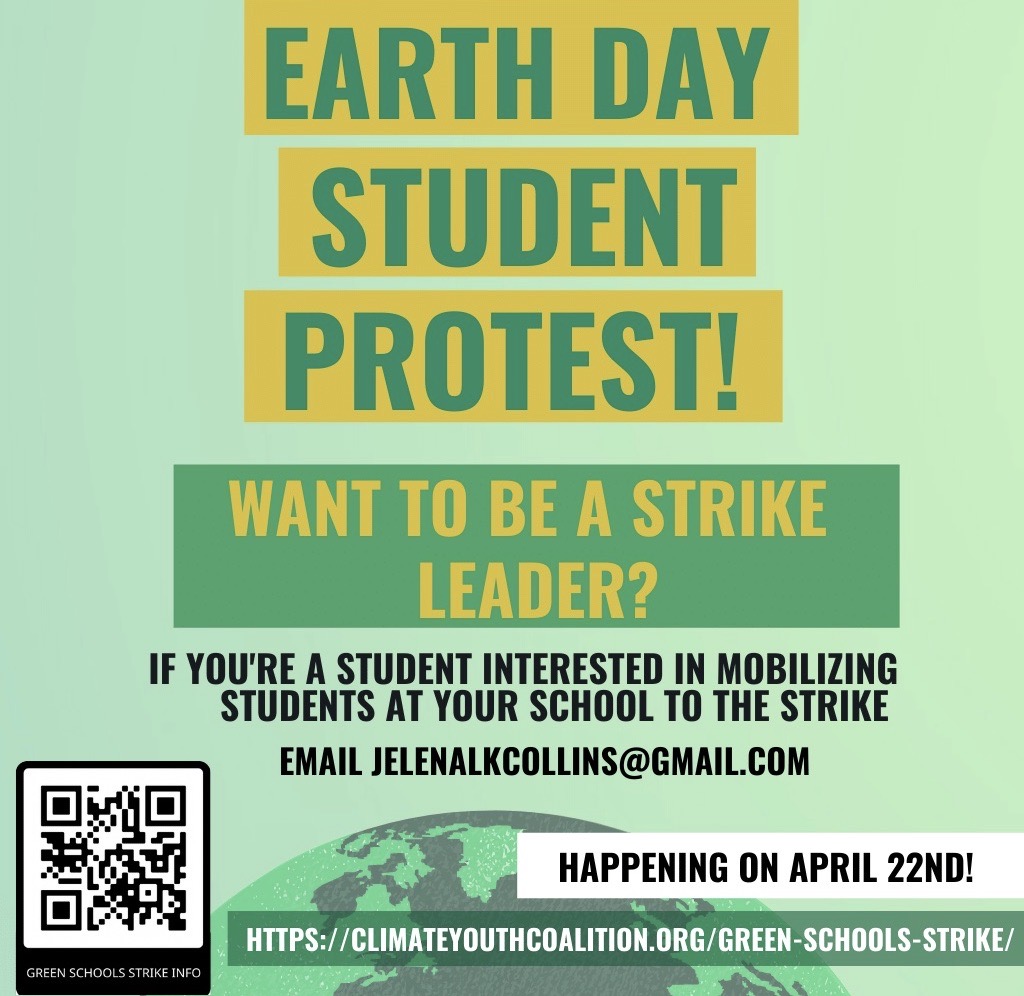
A Q&A with Jelena Collins, an organizer of the Earth Day Student Strike
Protesters will meet up at Buckingham Fountain in Chicago for the strike on Earth Day, April 22 at 2:30 p.m. Learn more and sign up to attend!
The following is an edited email conversation between editor Jane Goldenberg and Jelena Collins.
JG: What groups are organizing the event?
JC: The protest is organized by the Chicago Climate Youth Coalition as the leading group, but we’re also collaborating with Sunrise Chicago, Indivisible Chicago, the Illinois Green New Deal Coalition, Grassroots Collaborative, Chi-Rads, and, of course, The Climate Reality Project Chicago Metro Chapter! The coalition was formed as a sub-group of Climate Reality Chicago, and although we are our own group, we rely on CRC for advice and ideas!
JG: What can the Chicago Public Schools do to decrease its climate impact?
JC: CPS should retrofit its buildings — redo heating ventilation and air conditioning systems —ensure that its water and air are clean and improve system efficiency. It should also equip its schools with solar panels and electrify its fleet. In addition, CPS should standardize its climate curriculum in various subjects from elementary through high school to ensure that CPS grads are knowledgeable and able to make positive environmental change.
JG: What is your preferred timetable for CPS to accomplish these goals?
JC: The entire city has committed to running on 100% renewable electricity in buildings by 2035, so I think that if CPS can meet or beat this goal in terms of its energy sourcing, that would be ideal. I think it’s reasonable for a climate curriculum to be implemented in the near future and planning for the other changes to begin now.
The Chicago Public Schools should retrofit its buildings, equip its schools with solar panels and electrify its fleet. CPS should also standardize its climate curriculum from elementary through high school.
JG: Why is it so important?
JC: Students in schools on the South and West Sides of Chicago are actively suffering from the effects of lead in drinking water and poor quality air from industrial pollution. These issues need to be addressed via renovation and retrofitting immediately to protect the health and wellness of those students and their families. It isn’t fair for those students to grow up with a chronic exposure to heavy metals and toxins.
Curbing our greenhouse gas emissions is the best way for CPS to reduce its impact on our changing climate. Climate change has already led to worsening rainstorms, record-setting heat and more powerful hurricanes. We’re actively losing biodiversity and habitable land as our sea levels rise and our coasts flood, due to melting glaciers and Greenland ice.
We’ve passed the deadline to avoid irreversible biodiversity loss. However, we aren’t past the deadline to save much of what we have left.
JG: Is time running out?
JC: Time has already run out. Former Vice President Al Gore, told us at COP26 — the UN Climate Conference — in Glasgow that we had 6 1/2 years to hit net zero greenhouse gas emissions before we start to lose some of the world’s most valuable natural spaces. It’s been about six months since then, so we’re at about the six-year mark. We need to make change incredibly quickly to mitigate as much climatic damage as we can. That said, we’ve already damaged the environment beyond repair.
JG: What can students, teachers, parents do to help change the policies of CPS?
JC: Show that we care. If we all continue to advocate for green policies and positive environmental change, board members will begin to realize that climate change is a priority for the CPS community. If we show up in large numbers on Earth Day, I think that the Board of Education will see just how important this issue is. I also think we should engage in individual advocacy to remind the board that the environment ought to be higher up on its list of priorities. Emailing or calling the board or even speaking at board meetings is a fantastic way to keep the issue in the forefront.
JG: What do you hope your Earth Day protest will accomplish?
JC: I’m hoping that the attendance at our Earth Day protest will show how strongly students/teachers/parents value environmental action. I’m also hopeful that within the next year, CPS will pass policies to make at least one of the changes that I described above. All are good ways for CPS to make a positive impact on the climate.
JG: What’s next for you all?
JC: I’m planning to enroll at McGill University next year. However, the Chicago Climate Youth Coalition will continue its work, led by Danica Sun, a student at the Illinois Math and Science Academy, and Elliott Natura a student at Maine South. This strike is a great recruitment opportunity for the coalition, so I’m hopeful that the coalition will be bigger and better next year to expand its impact. I’ll keep presenting and speaking (of course) and I’ll be speaking at Sunrise’s Earth Day Climate Summit on the 23rd as well!

Jelena Collins is a senior at Oak Park and River Forest High School who’s been involved in environmentalism for three years. She became a trained Climate Reality Leader in July 2020 and has chaired our chapter’s Youth Action team. She attended the UN’s Climate Conference (COP26) as a delegate of It’s Our Future!

